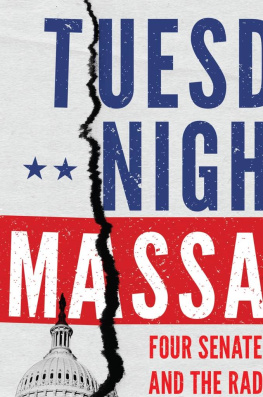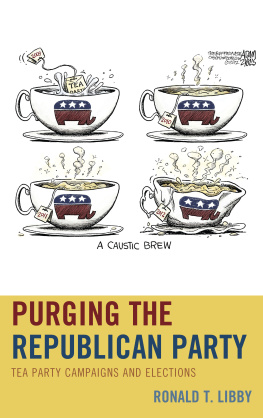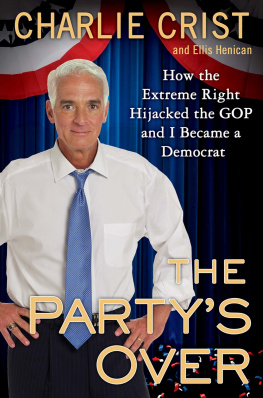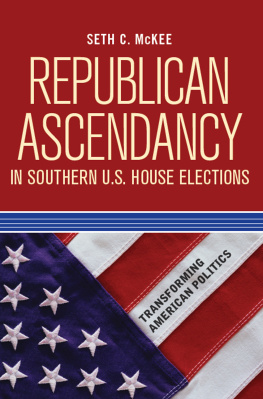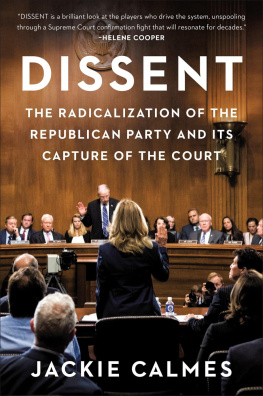Marc C. Johnson - Tuesday Night Massacre: Four Senate Elections and the Radicalization of the Republican Party
Here you can read online Marc C. Johnson - Tuesday Night Massacre: Four Senate Elections and the Radicalization of the Republican Party full text of the book (entire story) in english for free. Download pdf and epub, get meaning, cover and reviews about this ebook. year: 2021, publisher: University of Oklahoma Press, genre: Politics. Description of the work, (preface) as well as reviews are available. Best literature library LitArk.com created for fans of good reading and offers a wide selection of genres:
Romance novel
Science fiction
Adventure
Detective
Science
History
Home and family
Prose
Art
Politics
Computer
Non-fiction
Religion
Business
Children
Humor
Choose a favorite category and find really read worthwhile books. Enjoy immersion in the world of imagination, feel the emotions of the characters or learn something new for yourself, make an fascinating discovery.
- Book:Tuesday Night Massacre: Four Senate Elections and the Radicalization of the Republican Party
- Author:
- Publisher:University of Oklahoma Press
- Genre:
- Year:2021
- Rating:3 / 5
- Favourites:Add to favourites
- Your mark:
- 60
- 1
- 2
- 3
- 4
- 5
Tuesday Night Massacre: Four Senate Elections and the Radicalization of the Republican Party: summary, description and annotation
We offer to read an annotation, description, summary or preface (depends on what the author of the book "Tuesday Night Massacre: Four Senate Elections and the Radicalization of the Republican Party" wrote himself). If you haven't found the necessary information about the book — write in the comments, we will try to find it.
Marc C. Johnson: author's other books
Who wrote Tuesday Night Massacre: Four Senate Elections and the Radicalization of the Republican Party? Find out the surname, the name of the author of the book and a list of all author's works by series.
Tuesday Night Massacre: Four Senate Elections and the Radicalization of the Republican Party — read online for free the complete book (whole text) full work
Below is the text of the book, divided by pages. System saving the place of the last page read, allows you to conveniently read the book "Tuesday Night Massacre: Four Senate Elections and the Radicalization of the Republican Party" online for free, without having to search again every time where you left off. Put a bookmark, and you can go to the page where you finished reading at any time.
Font size:
Interval:
Bookmark:
TUESDAY NIGHT MASSACRE
FOUR SENATE ELECTIONS AND THE RADICALIZATION OF THE REPUBLICAN PARTY
MARC C. JOHNSON
UNIVERSITY OF OKLAHOMA PRESS
NORMAN

2800 Venture Drive
Norman, Oklahoma 73069
www.oupress.com
Copyright 2021 by the University of Oklahoma Press, Norman, Publishing Division of the University. Manufactured in the U.S.A.
All rights reserved. No part of this publication may be reproduced, stored in a retrieval system, or transmitted, in any form or by any means, electronic, mechanical, photocopying, recording, or otherwiseexcept as permitted under Section 107 or 108 of the United States Copyright Actwithout the prior permission of the University of Oklahoma Press.
For information about permission to reproduce selections from this book, write to Permissions, University of Oklahoma Press, 2800 Venture Drive, Norman, Oklahoma 73069 or email .
ISBN 978-0-8061-6857-9 (hardcover)
ISBN 978-0-8061-6953-8 (ebook : mobipocket)
ISBN 978-0-8061-6974-3 (ebook : epub)
This eBook was converted from the original source file by a third-party vendor. Readers who notice any formatting, textual, or readability issues are encouraged to contact the publisher at .
For Rob and Nathan
CONTENTS
INTRODUCTION
A NEW KIND OF POLITICS
Were on the cutting edge of politics.
JOHN T. TERRY DOLAN, COFOUNDER OF NCPAC
Just a few minutes past 8:00 P.M. Pacific time on November 4, 1980, president-elect Ronald Wilson Reagan took the stage of the Century Plaza Hotel ballroom in Los Angeles to claim one of the most lopsided presidential wins in American history. Reagan, a former Hollywood actor turned Republican governor of California, had, many thought improbably, won forty-five states and 489 electoral votes and denied Democratic incumbent Jimmy Carter a second term, inflicting a drubbing more complete than Herbert Hoover suffered in 1932 during the worst of the Great Depression. Carter, his campaign crippled by an energy crisis, out-of-control inflation, and a months-long hostage standoff with Iran, won only forty-nine electoral votes, taking just five states and the District of Columbia. Carter knew the night before the election that he would lose and lose big, and the television networks projected a Reagan victory early on election night. Ignoring the advice of aides who wanted to delay a concession speech until polls on the West Coast had closed, the president phoned Reagan at 9:01 P.M. eastern time to offer congratulations and formally conceded an hour later during a short, emotional speech delivered in a hotel ballroom in Washington, DC. It was the earliestand perhaps costliestconcession in presidential election history. There were reports of voters on the West Coast waiting in line to cast ballots who, upon hearing of Carters statement, left without voting. Many Democrats, already bearing the burden of an unpopular candidate at the top of the ticket, were livid, and several blamed Carter for ruining the chances of some candidates in the West who had lost close elections.
The 1980 defeat of several Senate Democrats was not a huge surprise. Herman Talmadge of Georgia, one of the last Democrats openly opposing civil rights, was dogged throughout his campaign by news accounts of a messy divorce and allegations of financial improprieties that led to a Senate censure vote. Washington States Warren Magnuson, a power in the Senate who had first been elected when Franklin Roosevelt was in the White House, was by 1980 a tottering seventy-five-year-old whose thirty-six years in the Senate became an issue. Maggie lost by seventy thousand votes. Gaylord Nelson, the Father of Earth Day and one of the Senates foremost conservationists, lost narrowly to an outspoken conservative Republican challenger in Wisconsin who was aided by Reagans comfortable win there and by Nelsons lackluster campaign. All told, Democrats lost twelve Senate seats in 1980, going from a fifty-eight-seat majority to a forty-six-seat minority. One Magnuson aide compared the Senate Democratic slaughter in 1980 to a plane crash: Everyone killed regardless of merit. The Senate has not been the same since.
This book deals with four other Senate elections in 1980, elections in which long-established and widely accomplished Democrats lost not because of some personal scandal or failure of campaign strategy. Rather, the four senatorsBirch Bayh of Indiana, Frank Church of Idaho, John Culver of Iowa, and George McGovern of South Dakotaendured months of sustained attacks on their character, their patriotism, and their honesty. The four incumbents began their reelection campaigns with favorable assessments from voters, but the attacks eroded that standing, and by November, each was viewed as unsuitable, indeed even dangerous. To be sure, 1980 was a difficult time to be a Democratic incumbent. Carters popularity was a drag on many down-ballot races. The Iran hostage crisis hovered over the entire campaign. Inflation was high, and memories of an energy crisis were fresh. All these factors contributed to the Democratic rout, but Bayh, Church, Culver, and McGovern were forced to confront another reality as well, one that turned out to be more difficult to counter than any difficult policy issue: the National Conservative Political Action Committee (NCPAC).
These liberal lions of the Senate, senators with a combined sixty-six years of service, politicians who had their names on such iconic legislation as the Wilderness Act and the creation of food stamps and who had steered constitutional amendments through the Senate, investigated the abuses of the nations intelligence community, and helped create better opportunities for women in college athletics, were targetedand relentlessly pummeledby NCPAC and a host of related conservative groups. Despite long records of public serviceboth Church and McGovern were also World War II veteransthe Democratic incumbents were repeatedly portrayed as out of touch with their states and with voters. This carefully choreographed national campaign of fear, animosity, half-truth, distortion, anger, and in some instances bald-faced lying was as unprecedented as it was effective.
The attacks were possible thanks to a largely unregulated phenomenon that was new to American politics in 1980 but has since become a widely employed attack vehicle: the independent expenditure campaign. Operating not in Indiana or Idaho but out of an office building in suburban Washington, DC, these lavishly funded efforts enjoyed remarkable success by targeting politically passive voters who could be stimulated with highly negative appeals to emotion. One of the founders of NCPAC, a young conservative Republican operative named John T. Terry Dolan, believed that relatively uninformed voters, even many who did not vote regularly, could be made to respond to highly negative attacks that presented divisive issues in stark, emotional, even fearful terms. Under the guise of correcting the record, the attacks were meant to damageor more correctly, to destroypolitical reputations, erode favorable attitudes long held by voters, and position incumbents for defeat by conservative Republican challengers.
There would be no nuanced positions on an issue like abortion. A senator who opposed a constitutional amendment to outlaw abortion would be branded a baby killer. Opposition to an expensive new weapons system, even by senators who had devoted their careers to mastering the details of foreign and defense policy, made a candidate a threat to national security. A principled belief that returning the Panama Canal to Panamanian control would best ensure its long-term operation would be dismissed as giving away the canal, likely to a communist-influenced government. As liberal became a pejorative, positions held by liberals were not, in the view of many in the New Right, worth debating, but were simply radical or dangerous.
Next pageFont size:
Interval:
Bookmark:
Similar books «Tuesday Night Massacre: Four Senate Elections and the Radicalization of the Republican Party»
Look at similar books to Tuesday Night Massacre: Four Senate Elections and the Radicalization of the Republican Party. We have selected literature similar in name and meaning in the hope of providing readers with more options to find new, interesting, not yet read works.
Discussion, reviews of the book Tuesday Night Massacre: Four Senate Elections and the Radicalization of the Republican Party and just readers' own opinions. Leave your comments, write what you think about the work, its meaning or the main characters. Specify what exactly you liked and what you didn't like, and why you think so.

